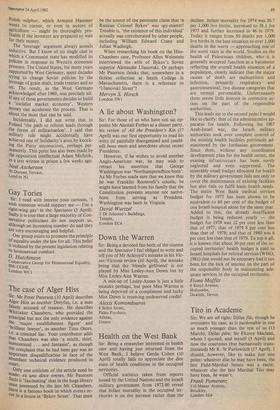Health on the West Bank
Sir: Being a researcher interested in health care and having just returned from the West Bank, I believe Gerda Cohen (10 April) totally fails to appreciate the dire state of health conditions in the occupied territories.
Official statistics taken from reports issued by the United Nations and the Israeli military government from 1972-80 reveal that infant mortality in the occupied ter- ritories is on the increase rather than the decline. Infant mortality for 1974 was 30.7 per 1,000 live births, increased to 38.1 for 1975 and further increased to 46 in 1979. Today it ranges from 50 deaths per 1,000 live births in the best situation to over 1,000 deaths in the worst — approaching one of the worst rates in the world. Studies on the health of Palestinian children, who it is generally accepted function as a barometer reflecting the overall health situation of a population, clearly indicate that the major causes of death are malnutrition and infection, primarily respiratory and gastrointestinal; two disease categories that are termed preventable. Unfortunately there seems little interest in corrective ac- tion on the part of the responsible authorities.
This leads me to the second point. I would like to clarify: that of the administrative ap- paratus for health. Following the 1967 Arab-Israel war, the Israeli military authorities took over complete control of the existing health facilities previously ad- ministered by the Jordanian government. Since then, without any coordinated development plan for the health sector, the existing infrastructure has been sorely neglected and even suppressed. The miserably small budget allocated for health by the military government fails not only to cover the maintenance of existing facilities but also fails to fulfil basic health needs. The entire West Bank medical services budget for 1975 has been shown to be equivalent to 60 per cent of the budget of one Israeli hospital alone for the same year. Added to this, the already insufficient budget is being reduced yearly — the budget for 1978 was 12 per cent less than that of 1977; that of 1979 8 per cent less than that of 1978; and that of 1980 was 6 per cent less than that of 1979. To top it all, it is known that about 30 per cent of the oc- cupied territories' health budget is paid to Israeli hospitals for referral services (WHO, 1981) that would not be necessary had it not been for the lack of interest on the part of the responsible body in maintaining ade- quate services in the occupied territories.
Fiona Moffitt
6 Rosyl Avenue, Holcombe, Dawlish, Devon






































 Previous page
Previous page